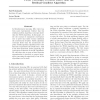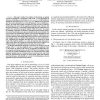403 search results - page 27 / 81 » Gradient clock synchronization |
101
click to vote
ICML
2003
IEEE
16 years 3 months ago
2003
IEEE
In Reinforcement Learning (RL) there has been some experimental evidence that the residual gradient algorithm converges slower than the TD(0) algorithm. In this paper, we use the ...
ICCAD
1999
IEEE
15 years 6 months ago
1999
IEEE
This paper considers the problem of determining an optimal clock skew schedule for a synchronous VLSI circuit. A novel formulation of clock skew scheduling as a constrained quadrat...
124
click to vote
PODC
1996
ACM
15 years 6 months ago
1996
ACM
We address the problem of the impossibility of implementing synchronous fault-tolerant service specifications in asynchronous distributed systems. We introduce a method for weaken...
119
click to vote
FORMATS
2004
Springer
15 years 6 months ago
2004
Springer
Davies and Wakerly show that Byzantine fault tolerance can be achieved by a cascade of broadcasts and middle value select functions. We present an extension of the Davies and Waker...
115
Voted
ICDCSW
2002
IEEE
15 years 7 months ago
2002
IEEE
Time-driven Key Sequencing (TKS) is a key management technique that synchronizes the session key used by a set of communicating principals based on time of day. This relatively lo...


